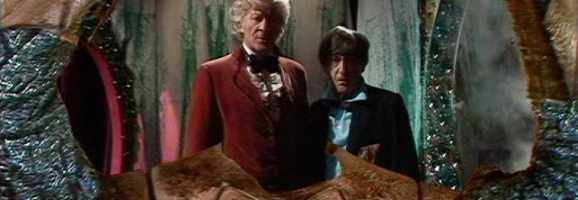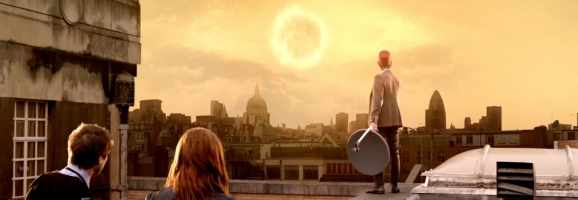The Doctor and Omega: Intertext in Moffat’s “The Big Bang”

Doctor Who is a science-fiction television show about the Doctor, a Time Lord, who travels in time (naturally enough) and saves planets. The show has been running since 1963 but with an (almost uninterrupted) hiatus from 1989-2005. Because of this hiatus, the show is often divided into two categories: the Classic series (pre-1990 plus the 1996 TV movie), and the new series (post 2005). Perhaps this divide is why current show runner Stephen Moffat shows a peculiar interest in intertext with the Classic series.
Intertext is simply referencing an outside work in your own. If a recent movie is hailed as a “modern Romeo and Juliette,” and if that movie even deliberately makes parallels to the classic play, that movie engages in intertext. Most of the new series references to the Classic series of Doctor Who seem intended to validate the new series as cannon. Most obvious is probably the quote in his “The Time of Angels” taken from the 1980 “City of Death”: “Not bad. Bit boring in the middle.” More impressive is when Moffat took what the Classic Who site merely speculated to be true – namely, that the Doctor was lying when he said guns did not work in the TARDIS – and made it cannon in his episode “Let’s Kill Hitler.” However, these references usually have little value beyond the fact that they’re references.
Intertext tends to get more interesting when Moffat references himself. “Don’t you dare,” for example, has vastly different meanings the two times it occurs (“Forest of the Dead” and “The Wedding of River Song”). However, this is intertext between the new series and the new series, and so it is not quite as impressive or mysterious as an intertext with the old series would be. More complex is a yet-unexplored intertext with the Omega legend (from the Classic series) in Moffat’s “The Big Bang.” What this intertext says about the character of the Doctor is not simple or straightforward and only brings more into focus some of the questions raised in the Doctor’s speech to the young Amelia.
This instance, unlike Moffat’s aforementioned intertextuality, is perhaps unintentional. Please understand that for the sake of time, I do not wish to engage in debates of where a text can get its meaning. Even if this example is unintentional, I take it for granted that the author does not need a say in what a work means. If we say a failed attempt to reference to the Iliad is not a reference, then by the same token, an unintentionally successful reference is still a reference. To read this article, please allow this basic assumption.
Who is Omega?
The legend of Omega is first introduced in the 1972-3 serial “The Three Doctors.” The legend is complicated at times by the novels and spinoff material and the introduction of the Other, but I tend to stick to television cannon, which does not (or at least not explicitly) mention the Other. According to this plot thread, the Time Lords became Time Lords when Rassilon and Omega invented time travel.
Omega was a solar engineer who flew the Hand of Omega into a sun going into supernova in hopes of obtaining for his people the power necessary to time travel. He succeeded, but at great cost to himself. Unfortunately, by going into the sun, he trapped himself on the other end of a black hole. Omega describes it as “be[ing] blown out of existence.” Indeed, by the end of the episode, we learn that Omega has more literally ceased to exist and could never reenter the real world because his body has deteriorated to nothing. In the revealing scene, he takes off his helmet but nothing is underneath.

Omega’s ultimate concern and the reason he is a villain is his desire for revenge against the Time Lords. He feels they’ve wronged him in that he is forgotten, along with all his efforts. “My brothers became the Time Lords,” he says, “but I was abandoned and forgotten.” Even as the Doctor objects, saying Omega was a hero to him, Omega says he should have been a god.
“The Big Bang”
At the end of series 5, Moffat put “The Big Bang.” There had been to this point cracks “in the skin of the universe” that could erase people and things from time. If someone fell into a crack, s/he didn’t just die; s/he literally ceased to exist. S/he’d be forgotten by everyone and the events in his/her life would have never happened. These cracks were caused by an explosion at the end of the universe, and this explosion happened in the episode immediately preceding “The Big Bang.”
The explosion was the TARDIS. And because the explosion operated much like the cracks it caused, all of reality had not just died but actually ceased to be.
Earth exists a little while longer because it was the “eye of the storm” – that is, the explosion happened on Earth. It’s not that it should exist, but just that it’s “the last light to go out.” Perhaps it should be noted that all this talk of anomalies and things that should not exist is very present in “The Three Doctors” as well. The Doctor and his companions, being on Earth, take advantage of this situation to try to “reboot the universe.” The plan is to fly a regenerating force into the exploding TARDIS.
They find the exploding TARDIS with ease. The TARDIS exploding would cause every star to supernova, and because the sun is a star, the actual sun must no longer be there. Instead, the TARDIS is the sun. The regenerating force meanwhile comes from the Pandorica, a prison with a regeneration field (“you can’t even escape by dying”) and a memory of the universe before it exploded (whatever was inside this perfect prison was not effected by the explosion).

So the Doctor, in order to save the universe, flies the Pandorica into the explosion. However, by flying himself into the explosion, he is on the wrong side when reality reboots. Just like people who fall into the cracks, the Doctor ceases to exist and all memory of him is purged from the universe. In a particularly moving speech, the Doctor says goodbye to his companion before he disappears from reality:
It’s funny. I thought if you could hear me, I could hang on somehow. Silly me. Silly old Doctor. When you wake up, you’ll have a mom and dad, and you won’t even remember me. Well, you’ll remember me a little. I’ll be a story in your head. That’s okay. We’re all stories in the end.
It seems evident from this quote that the Doctor has come to terms with the fact that he will not be remembered. He is okay being forgotten and happy to have saved the universe.
The Intertext
So Omega flew the Hand of Omega into a sun. The Doctor flew the Pandorica into the sun. Perhaps it is even worth noting that the second sun – the exploding TARDIS – was made possible by Omega’s first sacrifice. Omega was trapped in a universe of antimatter – “blown out of existence.” The Doctor was trapped on the other side of the cracks and never existed at all. Omega feels he was forgotten by everyone, while the Doctor was actually forgotten by everyone. Omega was not content to be a hero but wanted to be a god, while the Doctor was content to be a little-remember story in one girl’s head. Omega sought his escape while the Doctor –
And here’s where the text becomes a little more tricky. Until this point, it’s easy to see that the Doctor is a better Omega. The Doctor sacrificed everything and was not bitter and did not ask for anything in return. But his speech to the young Amelia goes on: he says he stole, or rather borrowed, the magic box (the TARDIS) that was brand new and ancient and the bluest blue ever. And then on Amy’s wedding day, she remembers the old saying: something old, something new, something borrow, something blue.
The Doctor, while claiming to be okay with the idea that he’ll be forgotten, while sacrificing himself to save the universe, has been planning his comeback. Lines planted before his final speech all lead to the understanding that he knew he’d come back: when Amy thinks he’ll be erased from time, he says, “Gotcha,” like he’s just pulled some joke, and a little later, he references the speech he has not made yet, telling one version of Amy to remember the speech. And once Amy has remembered the saying, and therefore has remembered the TARDIS, and therefore has remembered the Doctor back into reality (because if she could only remember something when the universe rebooted, she could bring it back), the Doctor appears in wedding attire, showing he knew full well she’d remember him into reality and even knew when she’d do it.

So how different is the Doctor from Omega? Certainly the Doctor does not swear revenge on humanity and come back to destroy it. But was he any more okay with being forgotten? Or is his virtue simply that he is more clever? Personally, I believe that it’s a little of both, and I’d like to think the Doctor could have been forgotten and would have taken it better. Still, the episode is very clear that the Doctor was more clever than Omega, but not as clear that he was more kind.
What is the moral of the story then? Is Doctor Who about being kinder, gentler, more forgiving than our enemies? Certainly, the Doctor often says it is. He forgives the master in “Last of the Time Lords;” he looks down on his clone for blowing up the Daleks in “Journey’s End;” he insists that the humans and Silurians make peace in “Cold Blood.” But he always wins. The only instance I can think of where the Doctor’s kindness causes him to lose is “Genesis of the Daleks,” when he’d rather let his arch enemies live to kill billions than let himself commit mass genocide. It seems the moral of the story is not always be good, but be clever, and nowhere more evidently than “The Big Bang.”
What do you think? Leave a comment.










The Three Doctors is my second or third most watched Who episode. It is so well executed.
I also love how we learn much later that what they are wearing on Gallifrey is the dress-down robe for when a giant collar would get in the way of panicking.
Oh and the First Doctor rolling his eyes and fixing all things. It is a shame William Hartnell was in such bad health, but surely this method has its advantages. It sort of sets up how Time Lords are not immune to senility and repeated uncontrolled regeneration is really bad for their continued emotional and mental health. One being able to simply look around and come up with a solution right after he arrived while the other 2 are stuck.
The realisation of the antimatter universe is essentially really cheap and disappointing which I think undermines the second half of the script. Although the performances are excellent, particularly Nicholas Courtney who gets some of his best moments in this story.
The use of the first Doctor in that script was brilliant, I agree. I like that Moffat wrote a similar character in the War Doctor. “The Three Doctors” just got the dynamic right with the two new ones bickering and the old one finding them faintly ridiculous.
It is fascinating how dense Jo Grant actually was, I mean really? No wonder this angered a lot of feminists in the seventies. It really is is quite extraordinary how badly her character was written.
Actually I enjoyed Jo for those moments she was written well. It’s kind of a shame since given what her training was supposed to be in, she could have been a bubbly female version of the Brig.
Quite an intriguing article. Cheers for the writeup.
I am a huge fan of Moffat and the directions that he’s taken the show. His show-running really enabled much of the new series’s relatively recent success. His use of canonical references and little one liners, as you mentioned, are really pretty rich! I always love a good analysis of recurrent themes and story concepts between the classic and new series. It was a really intriguing connection and I really want to believe that the parallelism was at least in part intentional! Thanks!
Great article! Love the topic 🙂
“Genesis of the Daleks” is a brilliant story, explains it all from the word go. This, along with “The Ark in Space”, “The Pyramids of Mars”, “The Seeds of Doom”, “The Robots of Death”, and “The Talons of Weng Chiang” is in my opinion one of the major high points of the show’s 40+ year run.
For any real doctor who fan, the 3 doctors is one of the great stories.
Doctor Who is super tricky to speculate on, in my opinion, because it’s so interwoven and involved. Perhaps this is due to continuity errors, as I’ve heard many people suggest, but I’m not completely sold on that point. I agree with you, where the Doctor always wins. He’s not exactly better than Omega when he flies the Pandorica into the sun, is he? He wants to come back. He likes the Earth, he likes being the Doctor. What I wonder is, if he wasn’t totally sure he’d come back, would he react like Omega did?
To me, the Doctor is one of those “I’ll have my cake and eat it too” characters, even though it’s asserted not everyone lives. A majority of the time, the Doctor comes out on top, but does this mean he’s a bad guy? Would he still sacrifice himself if he wasn’t 100% sure he’d come back?
I think the Doctor is an optimist, at least this latest version of him, and I think, if he can get away it with, his motto has always been “just this once, everybody lives!”
Interesting article, I enjoyed it!
Thanks for the compliment, and I agree with you in your optimist comment. I’m curious about the continuity errors remark because I don’t think I’ve heard that before. If I understand you, people say the character of the Doctor is hard to analyze because the writing’s inconsistent? I mean, I definitely do not believe the writing of his character is inconsistent (though perhaps some plot points are), but has this opinion been circulating in articles or on Twitter or where?
Quite an interesting article! I’m a fan of the new series, but you’ve given me the urge to go and start watching classic who finally. Cheers 🙂
Thanks for the compliment! And I’m glad you’re interested in the Classic series, but be careful: it can be a bit hard to break into. Personally, for a while, I found the humor aged better than the drama. If you decide to venture into drama, I might recommend “Inferno” with Jon Pertwee, but honestly, I’d start the Classic series with “City of Death” because I think a lot of the humor in that episode is more overt than in others. (You’ll find they don’t draw attention to punch lines, and some punch lines even seem mumbled.) I also have a friend who swears by (an unusual choice) “The Stones of Blood” because it’s just so ridiculous, and you might enjoy that if you go in with a mindset that it will be ridiculous. I found that before I appreciated the cheesy effects as good, I appreciated them as humorous, and I found before I appreciated the slower drama at all, I appreciated the slower jokes. And of course, the Doctor being ridiculous is easy to appreciate. Maybe look up a list of ways to get into the Classic series, but I’d stay away from “Genesis of the Daleks” and other famous dramatic episodes until you already like the Classic series pretty well.
That is great advice because I was looking to watch the original series as well. But why not watch it in order? Are there no overarching story lines or at least not as much in the original? I think the best way to watch a series is all the way through from the start, even if the first episodes aren’t as good as later ones, because you need the context.
The old series has very few story arcs. And the overarching story usually doesn’t have terribly much influence on the individual stories. Yes, there is a time lord lore, and you could watch a very specific track of episodes to understand all that. And there is Dalek lore, and you could watch certain episodes to better understand that. But the lore can be understood out of order because you get the original information out of order because it’s a show about time travel and because they don’t really count on you to have watched the whole thing. Sometimes the companions have more depth in their history – for example, Romana changes from someone who does not get along with the Doctor to someone who is the perfect counterpart to all his madness and genius. Personally, I think you can pick up any story in the Classic series and understand it just fine, so long as it is not part of one of the rare story arcs (Key to Time, Espace Trilogy, Black Gaurdian Trilogy, etc.), but even those are fairly straight forward and contain mostly individualized stories. If you want to be cautious, maybe you could start with the beginning of a companion. If you wanted to start when a companion starts, I’d recommend Romana Mark I, who’s an unpopular choice but is part of one of the rare story arcs and who reminds me a lot of River Song (you’d begin with Season 16, which is the Key to Time story arc) and whom I really think is hilarious. I wouldn’t start with the first Doctor, though, because a lot of the stuff is lost and they only have the audio. I tried to sit through some audio episodes, but I found it very painful. That’s me, and I know people who are very dedicated fans who did exactly what you described – began with the first Doctor and worked there way up – but I see the original series as extremely episodic and content to be episodic.
I’d also advise paying particular attention to when the Doctor is captured or caught in a lie since those are some of the finest moments. For example, here is an episode where he arrives on a planet and quickly discovers he matches the description for that planets devil: https://www.youtube.com/watch?v=geMx6y8ctFk
Wonderful article. Your writing style is clear and sraight forward. It is nice to read an article about Doctor Who that is laid out in such a way that fans of either series can understand it. I must say I do love the line” something old…”
Straight*
Totally agree with the last bit about how the moral is about being clever, rather than good or right. Spot-on television criticism.
I had never thought of that connection before, but you’ve definitely convinced me it could be intentional. Also, that last line about the moral of Doctor Who being “be clever” rather than “be good” is one of the most accurate ways to sum up the show that I’ve run across.